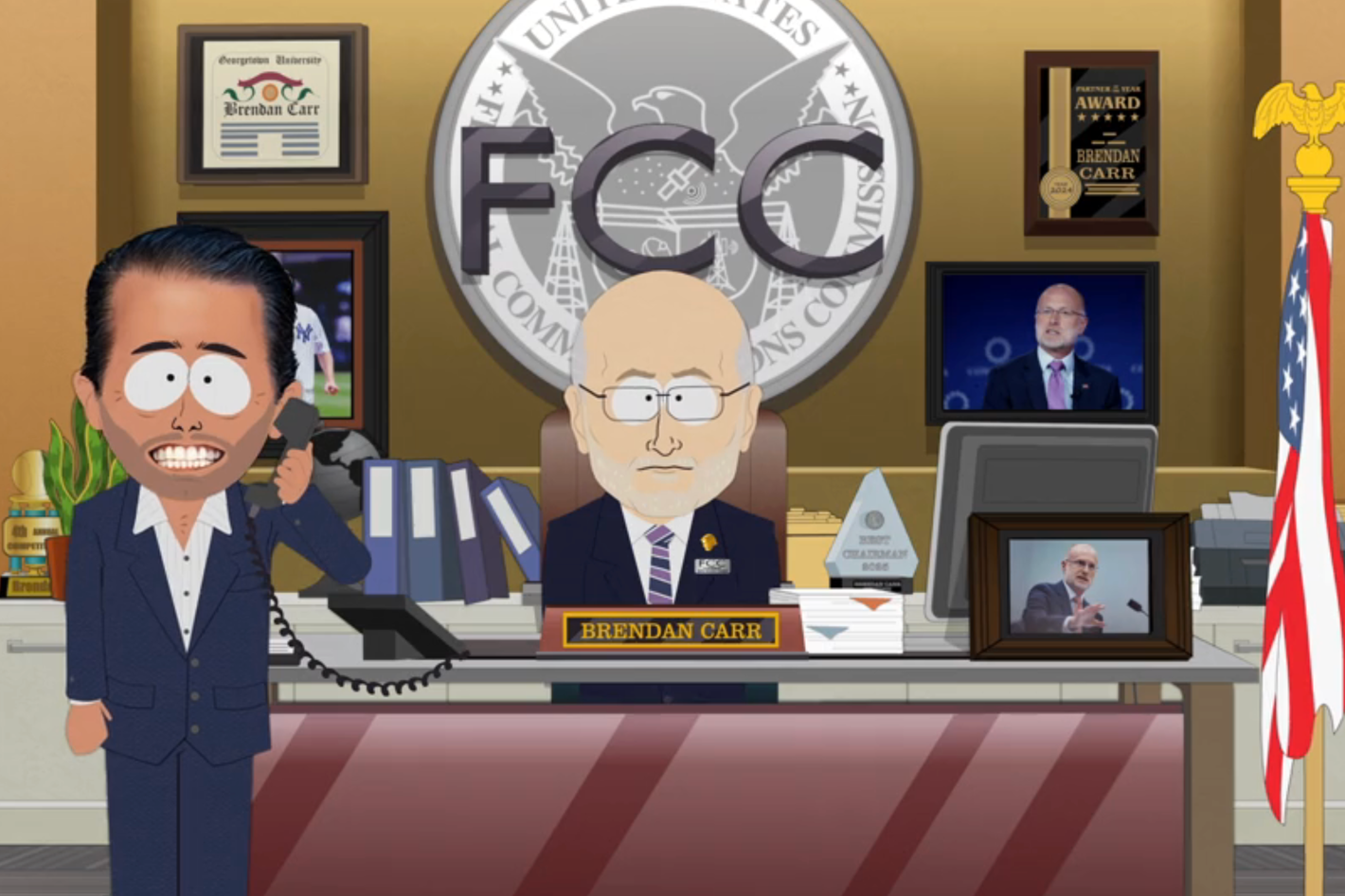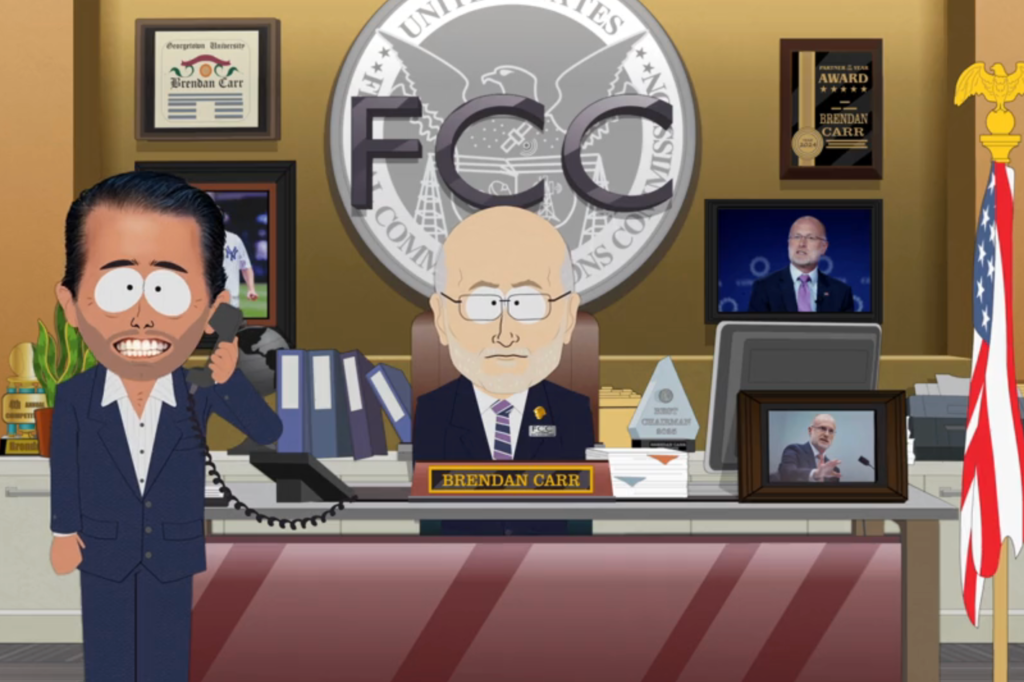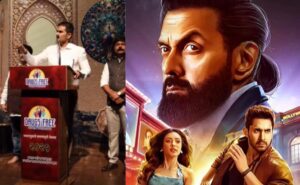
On Wednesday night, for the second evening in a row, I cleared my schedule to watch the latest installment of a linear TV broadcast that was neither an awards show nor live sports. Tuesday had been Jimmy Kimmel Live! on the occasion of his return from suspension; Wednesday was South Park. There was intrigue around the new episode. After a blistering opening run to the season where the show drew new relevance for directly skewering the Trump administration — complete with giving the president the Saddam Hussein treatment, not to mention a micro-penis — it drifted into tricky territory in the wake of Charlie Kirk’s September 10 assassination. The second episode from August 6, “Got a Nut,” satirized Kirk, casting Eric Cartman as a Kirk-style campus debater right down to the coiffed hair. Kirk, who was apparently a big South Park fan, had embraced the jab on X, but Comedy Central still pulled the episode from its broadcast lineup after his killing, citing sensitivity, even as it remained on streaming. The move had a whiff of preemptive speech chilling — one that would be vulnerable to attacks regardless of intent. Kirk’s executive producer, Andrew Colvet, protested that Kirk, a free-speech absolutist, wouldn’t have wanted it pulled. So when the show delayed its latest episode by a week, against the backdrop of fresh state-induced censorship fears after the Kimmel fight, it wasn’t hard to wonder if South Park was doubting its punches. For a famously freewheeling show that relishes mocking everyone from Mormons and environmentalists to MAGA nut jobs and the trans community, the prospect was unsettling: Had the chill caught up to even them?
That didn’t turn out to be the case. Last night’s episode, “Conflict of Interest,” continues the show’s pulse-on-the-culture streak, following up its Labubu-centric outing with a story line about the kids of South Park Elementary being swept up in the predictions-app craze. The device becomes a backdoor entry into tackling the Israel-Gaza conflict: Kyle, the core quartet’s lone Jewish member, is perturbed to discover classmates betting on whether his mother will “strike Gaza and destroy a Palestinian hospital.” (It’s a very long-shot wager.) Things escalate, and the plot concludes with Kyle’s mother flying to Israel to confront Benjamin Netanyahu: “Just who do you think you are? Killing thousands and flattening neighborhoods, then wrapping yourself in Judaism like it’s some shield from criticism!” Whatever the circumstances that led to the episode’s delay, the final product is quite the adherence to form. Any concern that South Park may be softening its free-speech edge in the name of shit stirring was allayed by its swerve straight into the most sensitive of topics, which viewers can reasonably interpret as the show effectively saying “Free Palestine.”
Meanwhile, President Trump remains a presence in the series, but mostly in the serialized B-plot. Satan is still pregnant with their Antichrist love child, but in “Conflict of Interest,” the president schemes to induce a miscarriage after realizing fatherhood will cut into his free time. (Never mind his many other children, including Donald Jr., who shows up as a hollow-brained lackey.) The episode still gets its topical jabs in: FCC chair Brendan Carr, who publicly pushed to yank Kimmel off the air, becomes collateral damage in Trump’s miscarriage antics. By the end, Carr is hospitalized, speech impaired, body broken, and wrecked by diarrhea as Vice-President J.D. Vance menaces him, furious that Carr accidentally interfered with Trump’s miscarriage efforts, because he wants to remain second in line for the presidency. (The baby, of course, would take over from Vance.)
Despite the intrigue, and the striking way “Conflict of Interest” openly critiques Israel, it is, in the end, fairly standard South Park. But what stood out was the anticipation: the anxious, almost nostalgic buzz around its release, not entirely unlike the build to Kimmel’s return to television the night before. Like many others, I tuned in on Tuesday night wondering how Kimmel would navigate the situation. To preserve the show, he needed to sufficiently thread the needle between humility and defiance in service of the status quo. His comeback monologue was broadly praised, aside from predictable detractors on the right. Despite the Sinclair-Nexstar boycott that blocked out the show’s broadcast in roughly 25 percent of American households, Kimmel’s return drew record ratings, and his monologue also garnered well over 20 million views on YouTube. For a fleeting stretch, it felt as if we were all locked into the same monocultural conversation around two programs that, on paper, should be relics of an era when the monoculture still made sense.
There’s something telling in this picture. Here we have two decades-old television institutions — one led by a late-night veteran, another led by longtime hot-button-issue pushers — that have reemerged as focal points in the fight over what can and cannot be said on air. The stakes feel heightened not because of the content itself, but because these shows, by sheer longevity, have become cultural infrastructure. That’s what makes these latest skirmishes over censorship feel extra charged: They are less about a single late-night comedian or satirical cartoon and more about an era where so many of our long-standing institutions are being actively dismantled. And it’s not as if we’re seeing new cultural institutions emerge that can fill the gap, either. During Kimmel’s suspension, there was some discussion about his potential alternatives — how, should a return to late night not be viable, he could easily start a podcast or a streaming show. (Bill Simmons, the wildly popular podcaster who was once an early writer on Kimmel’s show, argued as much.) That is obviously true, even though that’s not the point; the larger principle is that a president or the politics of a billion-dollar merger should not dictate what can be said on air.
But the speculation also underscored a deeper truth: The modern-media ecosystem has struggled to produce new shows that feel like true cultural institutions, something that can bind audiences into a single conversation. For now, regardless of how some may feel about them, Jimmy Kimmel Live! and South Park, vestiges of the old monoculture, are carrying that burden; in a few weeks, when Saturday Night Live returns, it will likely do the same. But these moments of shared attention are fleeting, less revival than mirage. They suggest how the monoculture seems to survive only in crisis: a suspension, a boycott, a geopolitical flash point. Outside of these moments, the audience scatters, the conversation splinters, and the mirage vanishes. What remains is the lingering suspicion that we will never find something to bind us together again.
Related
- South Park’s First Post–Charlie Kirk Episode Is About Financial Apps
- South Park Speaks Only for Itself
South Park and Jimmy Kimmel bound audiences into a single conversation this week. It won’t last.

































































